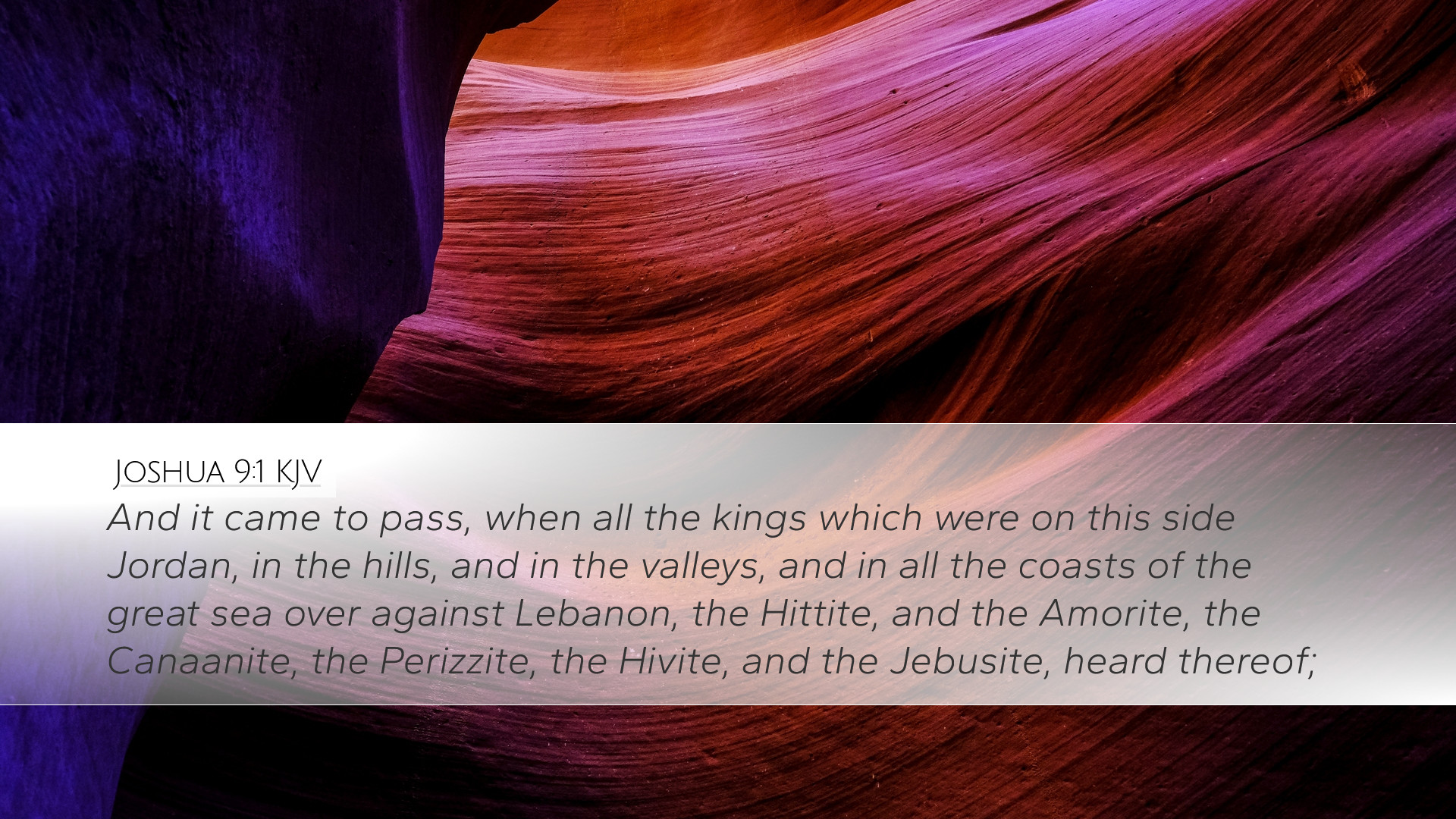Commentary on Joshua 9:1
Introduction
Joshua 9:1 presents a pivotal moment in the narrative of the Israelite conquest of Canaan. The verse states, "And it came to pass, when all the kings which were on this side Jordan, in the hills, and in the valleys, and in all the coasts of the great sea over against Lebanon, the Hittite, and the Amorite, and the Canaanite, the Perizzite, the Hivite, and the Jebusite, heard thereof." This statement sets the stage for a collective response from the nations dwelling in Canaan as they react to the advancing Israelites.
Contextual Analysis
This verse is significant because it follows the miraculous events of the Israelites crossing the Jordan River and the fall of Jericho. The reputation of Israel and their God was rapidly spreading, which instigated fear among the surrounding nations. As Matthew Henry notes, "The fame of the Israelites went out far and wide; the terror of them fell upon all nations." This fear led to political maneuverings, alliances, and attempts at deception, which become central themes in the ensuing chapters.
Geographical Significance
The verse specifies the geographical context—"in the hills, and in the valleys, and in all the coasts of the great sea over against Lebanon." This geographical terminology is essential in understanding the military and political landscape of ancient Canaan. Albert Barnes elaborates, explaining that the mention of specific regions signifies the extent of the Israelite influence and the imminent threat they posed to the Canaanite kingdoms.
Regional Powers
The verse lists a variety of groups: the Hittites, Amorites, Canaanites, Perizzites, Hivites, and Jebusites. Adam Clarke emphasizes the diversity among these nations, highlighting their common fear. Despite their differences, they were united in their concern regarding the Israelite conquest. This unity among the diverse nations shows a critical alliance against their common enemy.
Theological Implications
The fears expressed in this verse can be viewed through a theological lens, indicating the supremacy of God and His promises to Israel. These nations realized that they were confronted not just with the Israelites, but with the power of the God of Israel. As Matthew Henry points out, "The apprehension of danger made them look to the God of Israel, which is a remarkable parallel to the world’s acknowledgment of divine authority." This highlights the sovereignty of God in history and His ability to influence the hearts of nations.
Lessons for Today's Believers
The challenges faced by Israel are instructive for contemporary believers. The fear these nations felt can be translated into a modern context where the Church is facing opposition. Believers can glean the importance of trust and dependence on God in the face of adversarial circumstances. Albert Barnes remarked, "The Church of God, when it faithfully follows his guidance, is indeed a moving terror to the powers of darkness." This encourages believers to remain steadfast, knowing that they serve a God who is mighty to save and able to thwart the plans of His adversaries.
Responses and Reactions
The collective reaction of the Canaanite kings reminds us of the importance of strategic spiritual warfare. While they initially reacted with fear, they would soon resort to deception as documented in the subsequent chapters. Clarke notes that this moral decline—opting for deceit rather than facing the challenge head-on—illustrates humanity's tendency to avoid confrontation with the truth.
Application for Leaders and Scholars
For pastors and leaders, this verse serves as a reminder of the defining power of reputation and witness. A church that walks in faith, obedience, and holiness will inevitably encounter resistance from the world; however, this is an opportunity to showcase God’s glory. In this regard, it’s crucial that leaders not only promote biblical truth but also encourage their congregations to stand firm in faith. The fear instilled in the hearts of these nations demonstrates the profound impact that a faithful community can have in influencing culture.
Conclusion
Joshua 9:1 encapsulates significant themes of fear, unity, and the recognition of divine authority. Understanding these elements provides rich insights for theologians and scholars in approaching the text. It invites deep reflection on the sovereignty of God in human affairs, the power of collective fear, and the necessity of a faithful response to God’s calling in challenging times.


